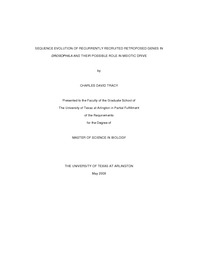| dc.contributor.author | Tracy, Charles David | en_US |
| dc.date.accessioned | 2009-09-16T18:18:28Z | |
| dc.date.available | 2009-09-16T18:18:28Z | |
| dc.date.issued | 2009-09-16T18:18:28Z | |
| dc.date.submitted | January 2009 | en_US |
| dc.identifier.other | DISS-10254 | en_US |
| dc.identifier.uri | http://hdl.handle.net/10106/1697 | |
| dc.description.abstract | Gene duplications are a valuable source of genetic information that can evolve under positive selection creating a new gene function without affecting the original function.A gene duplication mechanism is retroposition. Retroposed copies of genes (retrogenes) are created by reverse transcription of a mRNA into the host organism's genome producing a new sequence that has the same protein coding capacity as the parental gene but lacks introns and regulatory regions. Ran and Dntf-2 are genes involved in nuclear transport that have given rise to retrogenes three times in the Drosophila genus.Recently, genes involved in nuclear transport such as Ran and Dntf-2 were implicated in playing a major role in a chromosomal segregation distortion system in D. melanogaster. This thesis provides evidence of positive selection acting on the retrogenes and discusses the potential role of retroposed nuclear transport genes in segregation distortion. | en_US |
| dc.description.sponsorship | Betran, Esther | en_US |
| dc.language.iso | EN | en_US |
| dc.publisher | Biology | en_US |
| dc.title | Sequence Evolution Of Recurrently Recruited Retroposed Genes In Drosophila And Their Possible Role In Meiotic Drive | en_US |
| dc.type | M.S. | en_US |
| dc.contributor.committeeChair | Betran, Esther | en_US |
| dc.degree.department | Biology | en_US |
| dc.degree.discipline | Biology | en_US |
| dc.degree.grantor | University of Texas at Arlington | en_US |
| dc.degree.level | masters | en_US |
| dc.degree.name | M.S. | en_US |
| dc.identifier.externalLink | http://www.uta.edu/ra/real/editprofile.php?onlyview=1&pid=8 | |
| dc.identifier.externalLinkDescription | Link to Research Profiles | |

